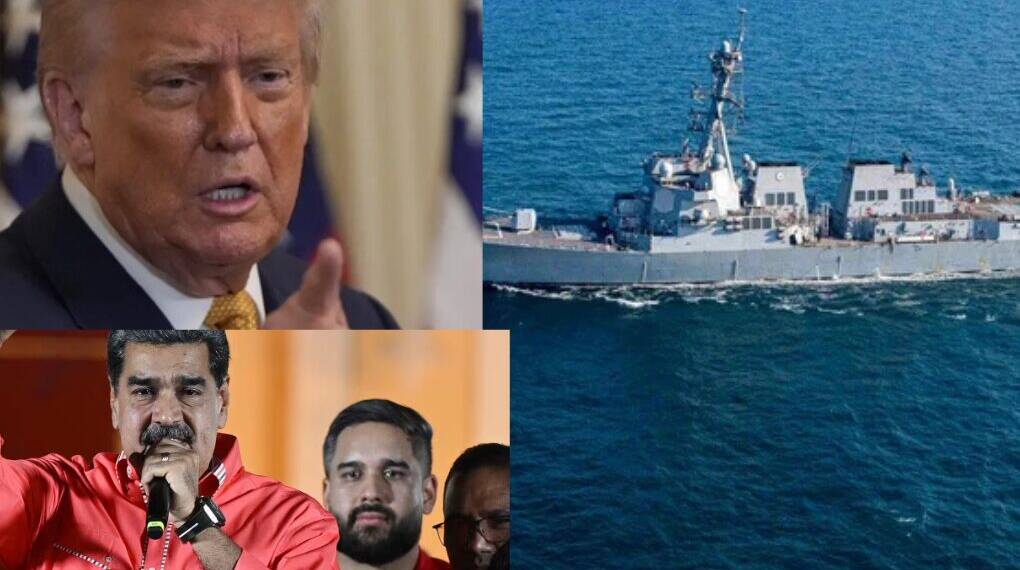Tensions are once again mounting in the Western Hemisphere as Venezuelan President Nicolás Maduro has accused the United States of “fabricating a new war” after Washington ordered the deployment of its largest and most advanced aircraft carrier, the USS Gerald R. Ford, to the Caribbean.
The move comes amid an intensifying standoff between the Trump administration and Caracas over allegations of drug trafficking and political repression.
The U.S. Military Build-Up
The Pentagon confirmed on Friday that the USS Gerald R. Ford, accompanied by a strike group of destroyers and support vessels, has entered the U.S. Southern Command’s operational area — encompassing Central America, South America, and the Caribbean. Pentagon spokesman Sean Parnell said the deployment is part of an “expanded anti-narcotics operation” aimed at disrupting smuggling routes and dismantling transnational criminal networks.
“The additional forces will enhance and augment existing capabilities to disrupt narcotics trafficking and degrade and dismantle transnational criminal organizations,” Parnell told reporters in Washington.
The Ford-class carrier, the largest warship ever built, is capable of carrying up to 90 aircraft, including advanced F/A-18 Super Hornets, E-2D Hawkeyes, and electronic warfare jets. Its arrival represents a major projection of U.S. firepower in the region — one not seen since the Iraq War era.
Maduro’s Outrage: “They Are Fabricating a War”
Venezuelan President Nicolás Maduro reacted sharply to the deployment, accusing Washington of seeking to provoke a new conflict in Latin America under the pretext of countering drug trafficking. Speaking on state television, Maduro declared,
“They promised they would never again get involved in a war, and they are fabricating a war. They want to turn our region into a battlefield once again. They seek a new eternal war.”
Maduro has long accused the U.S. of orchestrating efforts to overthrow his socialist government, especially after President Donald Trump openly called him a “narcotics kingpin” and “dictator” earlier this year. Trump has repeatedly stated that Venezuela’s regime poses a direct threat to U.S. national security through its alleged involvement in cocaine trafficking and alliance with “rogue nations” such as Iran and Russia.
Drug War or Political Strategy?
While Washington insists the military buildup is directed solely at combating narcotics smuggling, analysts and regional observers argue that the scale of the operation suggests broader strategic motives. The Caribbean and northern South America have seen intermittent drug trafficking routes, but most U.S. anti-narcotics missions historically relied on smaller Coast Guard and aerial operations—not aircraft carriers.
Experts note that Venezuela’s actual role in the global drug trade is relatively minor compared to Colombia or Peru. According to the United Nations Office on Drugs and Crime (UNODC), Venezuela primarily serves as a transit point rather than a major producer of narcotics.
“This deployment seems more about political pressure than drug enforcement,” said Dr. Rafael Uzcátegui, a Caracas-based political analyst. “The Ford’s presence near Venezuelan waters is a signal—an unmistakable show of power aimed at intimidating the Maduro government and rallying domestic support for Trump ahead of a tense global environment.”
Trump’s Hardline Stance
Trump, who has frequently tied his foreign policy rhetoric to strong military posturing, doubled down earlier this week. Speaking at a rally in Florida, he hinted at possible “land operations” to halt narcotics smuggling:
“We stopped all drugs from coming in by sea. I will stop all drugs from coming in by land very shortly. You’ll see that starting.”
The statement immediately fueled speculation that Washington could be considering limited airstrikes or special operations against alleged cocaine-processing sites in Venezuela. CNN reported that U.S. reconnaissance aircraft have increased patrols around Puerto Rico and the eastern Caribbean, although officials stressed that “no final decision” on strikes has been made.
Regional and International Reactions
Latin American governments have responded cautiously. Colombia and Brazil—both traditionally aligned with Washington—have refrained from public comment. Meanwhile, Cuba and Nicaragua expressed solidarity with Maduro, denouncing what they called “U.S. imperial aggression.”
Russia, a long-time ally of Caracas, has also voiced concern. The Russian Foreign Ministry issued a brief statement warning against “any unilateral military actions that could destabilize the region.” Moscow maintains a limited military presence in Venezuela, including advisors and technicians supporting air defense systems.
A Brewing Crisis
For many Venezuelans, the latest developments evoke memories of the 2019 confrontation, when the U.S. and dozens of Western nations recognized opposition leader Juan Guaidó as Venezuela’s interim president following disputed elections. Although that effort fizzled, tensions between Washington and Caracas never fully eased.
Now, with a U.S. supercarrier stationed nearby and rhetoric on both sides hardening, the Caribbean could again become a flashpoint in hemispheric geopolitics.
“Every time Venezuela tries to stabilize, external forces appear to stir up conflict,” Maduro claimed. “We will defend our sovereignty and peace with all our strength.”
As of Saturday, there were no reports of direct U.S.–Venezuelan military contact, but the potential for escalation remains high. The USS Gerald R. Ford’s presence underscores not only Washington’s growing impatience with the Maduro regime but also its willingness to flex hard power in its own geopolitical backyard—a move that could shape the balance of power in Latin America for years to come.








